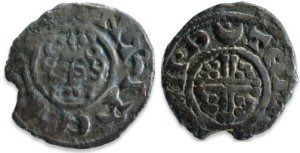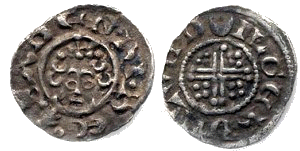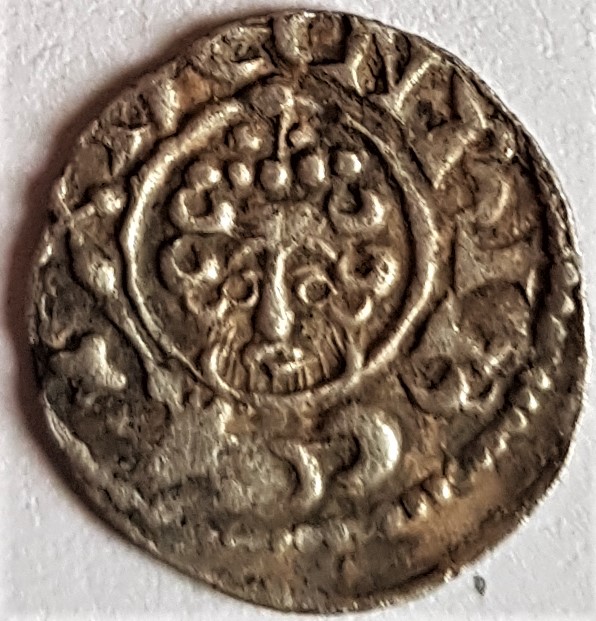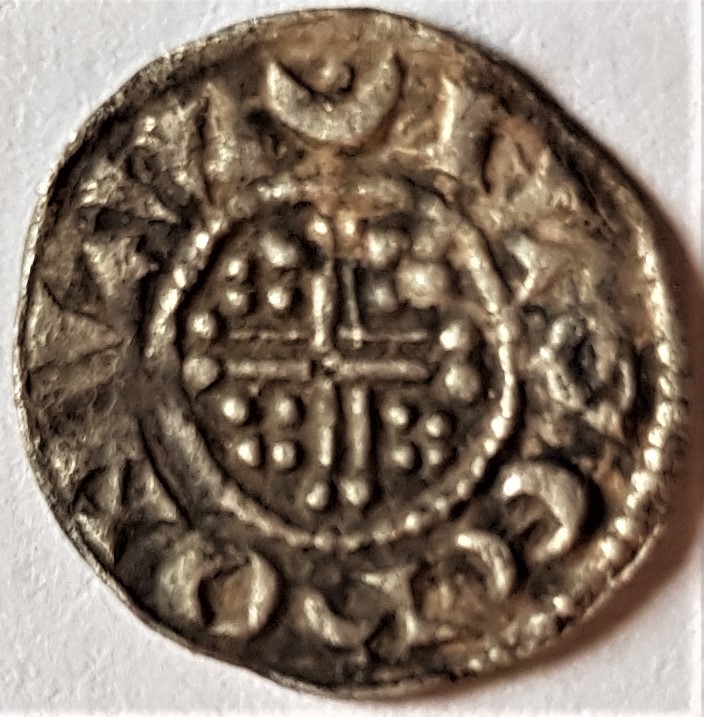Overview:
On Ash-Wednesday 1222 Ilger, King Henry III's goldsmith and three others, as Custodes Monetae of the City of London; Adam Blund, and seven others, Custodes Cuneorum [keepers of the dies]; were sworn before the Justiciary. "On the same day eight dies for making halfpennies and farthings, were delivered to them. And afterward, on the Thursday before Easter, eight dies for pennies, eight for halfpennies, and the same number for farthings" were further supplied, over and above the eight before mentioned."1
There is documentary evidence that significant numbers of farthings were produced and in circulation, for on 25 February 1224 all Sheriffs were commanded "to make [a] proclamation that, within 15 days after Easter, no halfpenny or farthing should be current unless it were round; and that no others should be paid, or received, on pain of forfeiture."2
Currently "round" Hammered Silver Farthings of Henry III are extremely scarce - with only 8 examples identified3 (all found within the last 3 decades using metal detectors).
But, with the popularity of metal detectors, it's only a matter of time before
more turn up.

Date: c.1222
Mint: London
Moneyer: Terri (Terricus le Chaunier - a Custodes Monetae)
Diameter: 10mm
Weight: Unrecorded
Obverse: Facing portrait, with sceptre in the legend.
Legend starts at 11 o'clock, HEN·RI·RE X
Reverse: Horizontal crescent surrounding a pellet, followed by
TERRIONLVN·D. "Short Cross" with four pellets in each quarter.
Reference(s):
S.1357E
Class: Similar to a Henry III class 7 penny.
In the British Museum Collection (ref: CM 1991-4-2-1)
Notes:
The production of silver farthings by TERRI was authorised by the
Patent Rolls of 1222, but until this coin was discovered in 1991, no
example of Henry III Farthings had been found4.
Scarcity: Three known
Guide Price:
£2500 (Fine)
£5000 (Very Fine)

Date: c. 1222
Mint: London
Moneyer: Ilger (Ilgerius Aurifaber - the king's goldsmith and a Custodes Monetae)
Diameter: 10mm
Weight: 0.31g
Obverse: Facing portrait, with sceptre in the legend.
Legend starts at 11 o'clock, HEN·RI·RE X
Reverse: Horizontal crescent surrounding a pellet, followed by
ILGERONLVND. "Short Cross" with four pellets in each quarter.
Reference(s):
S.1357E
Class: Similar to a Henry III class 7 penny.
In the Birmingham City Museum and Art Gallery
Notes:
The production of silver farthings by ILGER was authorised by the
Patent Rolls of 1222, but it was not until 1991 that any example
of a Henry III farthing was known to exist4.
The first example of from this moneyer is currently in a
private collection. A Henry III farthing of ILGER was sold by CNG,
Auction 38, 6-7 June 1996, lot 1765 - and may be this example.
The second example from this moneyer recorded in the Coin
Register 2001 in BNJ 2001, vol. 71. p. 188, record number 106:
weight: 0.31g (4.78 gr), a metal detecting find in the Spring
of 2001 at Pershore, near Worcestershire. Acquired by Birmingham
Museum and Art Gallery (with grant aid from Resource/V & A
Purchase Grant Museum Fund), accession no. 2001 C 13.
Scarcity: Two known
Guide Price:
£2500 (Fine)
£5000 (Very Fine)


Date: c. 1222
Mint: London
Moneyer: Ilger (Ilgerius Aurifaber - the king's goldsmith and a Custodes Monetae)
Diameter: 10mm
Weight: 0.32g
Obverse: Facing portrait, with sceptre in the legend.
Legend starts at 11 o'clock, HEN·RI·RE X
Reverse: Horizontal crescent surrounding a pellet, followed by
a shorter legend to the previous Ilger farthing: ILGERONLV. "Short
Cross" with four pellets in each quarter.
Reference(s):
S.1357E
Class: Similar to a Henry III class 7 penny
Notes:
The production of silver farthings by ILGER was authorised by the
Patent Rolls of 1222, but it was not until 1991 that any example
of a Henry III farthing was known to exist4.
This is the third example of a farthings struck by Ilger, but this has
a shorter legend.
Scarcity: Currently unique
Guide Price:
£2500 (Fine)
£5000 (Very Fine)
Date: c. 1222
Mint: London
Moneyer: Adam (Adam Blund - a Custodes Cuneorum)
Diameter: 10mm
Weight: 0.31g
Obverse: Facing portrait, with sceptre in the legend.
Legend starts at 11 o'clock, HEN·RI·RE X
Reverse: Horizontal crescent surrounding a pellet, followed by
ADAMONLVND?. "Short Cross" with four pellets in each quarter.
Reference(s):
S.1357E
Class: Similar to a Henry III class 7 penny
Notes:
The production of silver farthings by ADAM was authorised by the
Patent Rolls of 1222, but it was not until 1991 than any example
of a Henry III farthing was known to exist4.
Scarcity: Currently unique
Guide Price:
£3000 (Fine)
£6500 (Very Fine)
Date: c. 1222
Mint: London
Moneyer: RAULF (Randulf Frowik)
Diameter: 10mm
Weight: 0.31g
Obverse: Facing portrait, with sceptre in the legend.
Legend starts at 11 o'clock, HEN·RI·RE X
Reverse: Horizontal crescent surrounding a pellet, followed by
RAUFONLVND?. "Short Cross" with four pellets in each quarter.
Reference(s):
S.1357E
Class: Similar to a Henry III class 7 penny
Notes:
The production of silver farthings by RAULF was authorised by the
Patent Rolls of 1222, but it was not until 1991 than any example
of a Henry III farthing was known to exist4.
In the sale catalogue for the sale of a Henry III farthing in CNG,
Auction 38, 6-7 June 1996, lot 1765, the item description states
that a RAULF farthing was known.5.
Scarcity: Currently unique
Guide Price:
£3000 (Fine)
£6500 (Very Fine)
Can't find your coin?
1 Ruding, R. (1817). ANNALS OF THE COINAGE OF BRITAIN. Vol. 1,
p.348.
2 Ruding p.349.
3 Rogers, DJ. & Bolton, A. (2001). COIN REGISTER. The British
Numismatic Journal, 71, p.188 & pl.43. Retrieved from
http://www.britnumsoc.org/publications/Digital BNJ
4 Mathew, N. & Smith, A. (September 1989). A ROUND SHORT
CROSS HALFPENNY OF HENRY III. Seaby's Coin & Medal
Bulletin, 843, p.199-200.
5 CNG, Auction 38, 6-7 June 1996, lot 1765.





![Validate my RSS feed [Valid RSS]](../valid-rss.png)